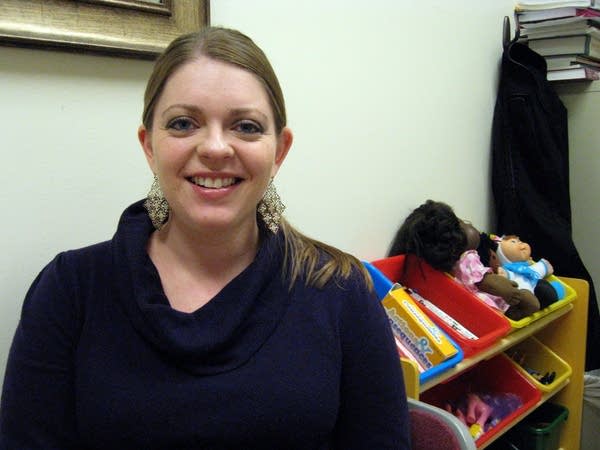School-based therapy helps families, children in need

Many children in Minnesota wait months for mental health services due to a severe shortage of providers. But some schools have managed to get their students to the front of the line by partnering directly with mental health agencies, a program that has served 8,400 children in the last two years.
School-based therapy is convenient for children and their families and schools, and helps students get back on track academically much sooner. But nearly $4.8 million in annual state funding for the three-year program could be in jeopardy as state legislators debate whether to continue the service.
Not continuing it would be a setback for parents who depend on such services. Among them is Clarence Scott, of Minneapolis, who has found parenting much harder since his wife died six years ago.
Scott, 56, he has no trouble making dinner for his two sons. But he's found it tough to juggle home and school as a single father.
Create a More Connected Minnesota
MPR News is your trusted resource for the news you need. With your support, MPR News brings accessible, courageous journalism and authentic conversation to everyone - free of paywalls and barriers. Your gift makes a difference.
His toughest challenge has come from his youngest son, 11-year-old Darrius, who went into a deep depression after his mother's death and struggled at school.

"No response. No laughing, no nothing," Scott said. "It's just like daydreaming. Just staring, you know, just shut down. You know something is wrong."
At first, Scott didn't question his son much about his change in behavior, fearful that he wouldn't know how to help him.
Scott struggled with what to do for years. That changed a couple of years ago when he attended a carnival night at his son's school. That's where he met mental health therapist Kate Rickord.
Rickord is employed by a nonprofit children's mental health agency called the Washburn Center for Children, based in south Minneapolis. Her office is at Darrius's school, Nellie Stone Johnson Community School, one of 15 Minneapolis schools that have set aside space for a full-time, independent mental health therapist.
For the past two years, Rickord has met with Darrius for weekly therapy sessions of 50 minutes during school hours. She also makes monthly visits to his home, where she learned that losing a mother hit the family hard.
"They too had to learn who are we without this person who was really primary in being the matriarch," Rickford said, "and who kind of assumes some of those roles?"

Darrius, who is now in sixth grade, said Rickord has helped him focus on school and taught him that it's OK to express his feelings.
"She helped me to set up some goals," he said. "It helped me better when I talk about my mom, ask questions about her and stuff."
Much of Rickord's time is paid through either health insurance claims or by Hennepin County, which picks up the tab for qualifying families who don't have insurance.
Schools also contribute some funds to the program. A state grant helps pay for the time that Rickord spends coaching teachers. She said there are many strategies that can help kids function better in the classroom.
"Sometimes they're really simple, like if you have a kid who has a history of traumatic stress, setting them at a place where they can see the door and see who walks in the door," she said.
That way, the student doesn't have to keep turning around in a way that makes it looks like he's not paying attention, she said.
The schools that have a full-time mental health therapist, rave about the program, said Mark Bonine, an associate superintendent in the Minneapolis Public Schools. Last year, Bonine was the principal at Nellie Stone Johnson.
"I wished I had another therapist when I was a principal," Bonine said. "The need was that great."
As a result of the therapist program, there are fewer emotional and behavior problems at Nellie Stone Johnson, according to surveys of parents and teachers.
Bonine said therapists have reduced the number of students who need special education programs or more intensive, out-patient treatment. Across the city, that helps keep more students in the classroom, he said.
The program also has reduced suspensions, said Mark Sander, mental health coordinator for Hennepin County and the Minneapolis Public Schools.
Still, not everyone is happy with the program. During a state Senate committee hearing in February, some groups testified against the school-linked mental health program, arguing that access to professional therapists increases the likelihood that students will be diagnosed with a mental illness and treated with medication.
Sue Abderholden, executive director of the National Alliance on Mental Illness, Minnesota, rebutted those assertions during the Senate's hearing. She said the program gives access to families who are desperate for help, but often have few resources to seek out that help.
"This is not someone at the school saying 'I think your kid has a mental illness, we're going to put them in treatment.' " Abderholden said. "The concerns are brought sometimes by family members, sometimes by teachers, sometimes by the school social worker or the psychologist and it is absolutely with parental involvement and permission."
Despite its successes, the future of the program remains in doubt. Funding for school-linked mental health grants was eliminated in the Senate's budget. The House and Gov. Mark Dayton fully funded the program in their budgets. A conference committee will be charged with working out a compromise.
